Index relies entirely on the support of donors and readers to do its work.
Help us keep amplifying censored voices today.
In the name of counter-terrorism, police raided the houses of journalists in Diyarbakır, in the Kurdish region of Turkey, on 8 June. They took into custody 19 journalists, two media employees and one citizen, who had given an interview to a journalist. Two criminal investigations were announced to target “the Press Structure of the Kurdish Workers Party (PKK) and Kurdistan Communities Union (KCK)”.
Journalists who work in eastern Turkey face tremendous pressures as they are almost always the ones who expose rights violations by the state in a conflict between Turkish authorities and Kurdish groups, which has been going on since the early 1980s. The PKK has called for more rights for Kurdish people, and the armed conflict has cost over 40,000 lives. Turkey considers the PKK a terrorist organisation, as do the EU and US.
In addition to the journalists’ houses, police raided the offices of three production companies and the women’s news agency Jin News in an unlawful manner. The search conducted at the Jin News agency was carried out without any representative of the agency being notified or present. The police are yet to provide a record of what has been confiscated.
After being extended twice, the custody period eventually amounted to eight days. In her indictment-like extension petitions, the prosecutor directly accused the journalists without presenting any evidence. Furthermore, she justified the extensions by saying the confiscated material needed extensive examination. According to the lawyers, however, this long custody period served the manufacturing of new evidence.
The interrogation of the journalists began on 15 June at around 9am. The prosecutor questioned the journalists about their professional activities. She asked why they worked at their respective media outlets, why they produced particular programmes or news articles, and why they used specific expressions.
While neither the lawyers nor the journalists were granted access to the investigation file – which violated their right to defence – investigation details were leaked to media organisations close to the government. According to these news reports, journalists are accused of “operating as the PKK and KCK Press Structure.”
After an interrogation lasting nearly 20 hours, the prosecutor referred 18 journalists, two media employees and one citizen to the Diyarbakır 1st Criminal Judgeship of Peace and requested their arrest on suspicion of “membership of a terrorist organisation”. Within 15 minutes, the judge ruled to arrest 16 of the journalists. In the decisions, the judge did not refer to any concrete evidence other than the testimonies of defectors from the PKK who claimed that the journalists produced content for Sterk TV, Medya Haber TV, Jin TV and Rohani TV – all of which are considered as PKK outlets by Turkish authorities. The judge released four journalists, one media employee and the sole citizen from custody, along with judicial control measures.
This is not an isolated incident. A recent example is when five journalists reported on two villagers who were tortured and thrown out of a helicopter by security forces in Van, also in eastern Turkey. Four of them were held in pre-trial detention for six months until the first hearing. Accompanied with discrediting campaigns on social and mainstream media, these journalists were tried under terrorism charges and were eventually acquitted. Acquitted or not, this recent operation is the largest of its kind targeting the Kurdish press in recent years. It is reminiscent of the infamous “KCK Press Trials”, in which 46 journalists and media employees have been standing trial for the past 10 years.
This latest operation targeting Kurdish journalists signals that the government is once again flexing its muscles to silence journalists in the region ahead of the upcoming elections next year.
The 16 arrested journalists:
Lezgin Akdeniz: Camera operator, TV show producer
Safiye Alagaş: Jin News Director
Serdar Altan: Freelance journalist, Dicle Fırat Journalists’ Association (DFG) Co-chair
Zeynel Abidin Bulut: Xwebûn editor, DFG executive
Ömer Çelik: TV show host, former Mesopotamia News Agency editor
Suat Doğuhan: Camera operator, Pel Production owner
Mehmet Ali Ertaş: Xwebûn Editor-in-chief
Ramazan Geciken: Pel Production camera operator
Mazlum Doğan Güler: Piya Production camera operator
İbrahim Koyuncu: Camera operator, video editor
Abdurrahman Öncü: Pel Production camera operator
Aziz Oruç: Mesopotamia News Agency editor
Mehmet Şahin: Xwebûn columnist, teacher
Neşe Toprak: Pel Production TV show producer
Elif Üngür: Piya Production TV show host
Remziye Temel: Piya Production accountant
For more details on the arrests, visit MLSA.
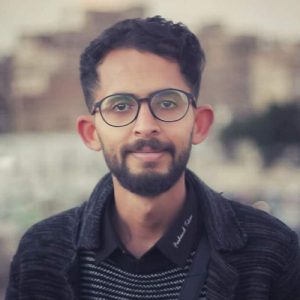 Yemeni artist Thiyazen Al-Alawi uses his craft to shed light on the destructive situation in Yemen through street art campaigns. He hopes to inform the public of what the war has done to his homeland.
Yemeni artist Thiyazen Al-Alawi uses his craft to shed light on the destructive situation in Yemen through street art campaigns. He hopes to inform the public of what the war has done to his homeland.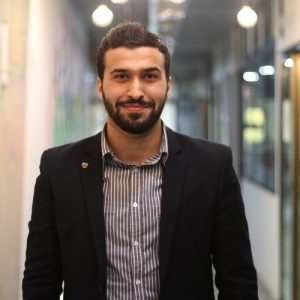 Moe Moussa is a journalist, podcaster, poet, and the founder of the Gaza Poet Society. He uses various forums and mediums to amplify the voices of Palestinians.
Moe Moussa is a journalist, podcaster, poet, and the founder of the Gaza Poet Society. He uses various forums and mediums to amplify the voices of Palestinians.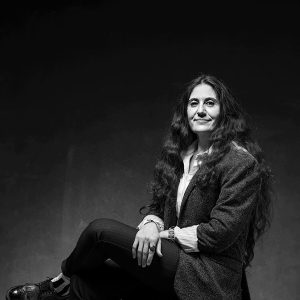 Fatoş İrwen is a Kurdish artist and teacher from Diyarbakır, Turkey working with a variety of materials and techniques.
Fatoş İrwen is a Kurdish artist and teacher from Diyarbakır, Turkey working with a variety of materials and techniques.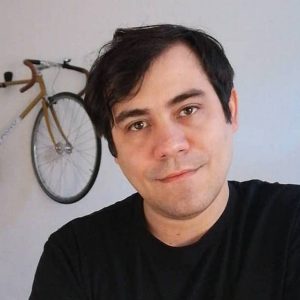 Hamlet Lavastida has been described as a political activist by way of art. Lavastida uses his art to document human rights abuses in Cuba and to criticise Cuban authorities.
Hamlet Lavastida has been described as a political activist by way of art. Lavastida uses his art to document human rights abuses in Cuba and to criticise Cuban authorities.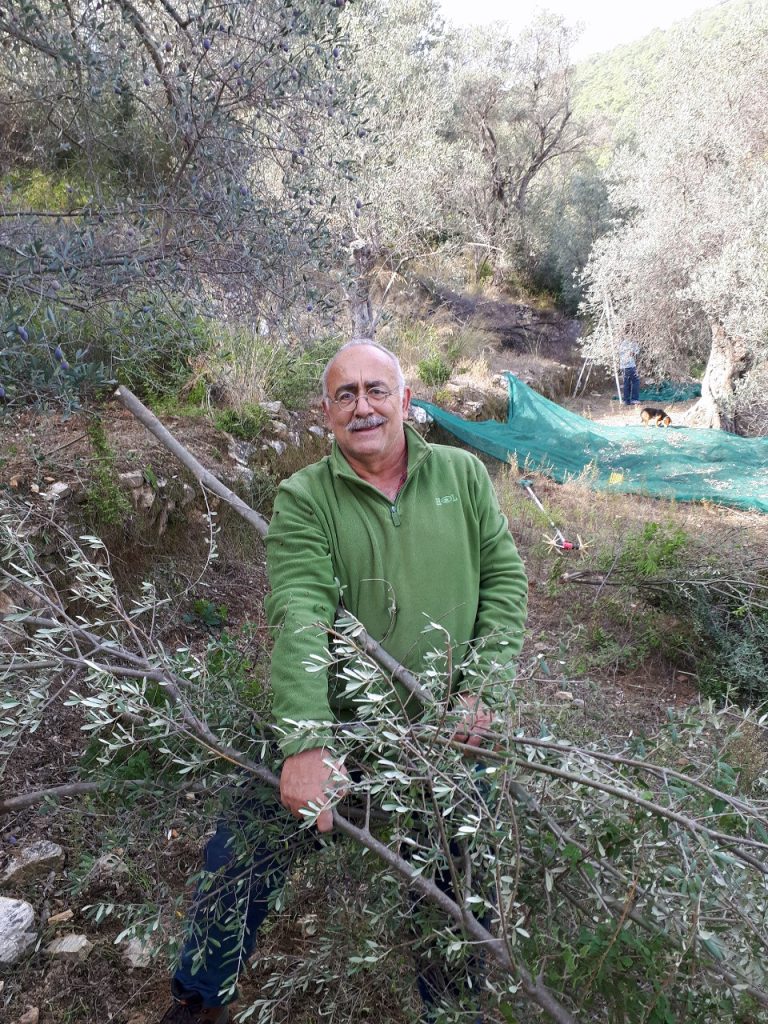
Sevan Nişanyan at home in Samos
A prominent Turkish-Armenian academic faces deportation from Greece after being labelled an “undesirable foreigner” in what he sees as punishment for creating a database of Greek placenames and how they have changed through history.
Sevan Nişanyan, born in Istanbul in 1956, is a linguist and compiler of the hugely comprehensive Etymological Dictionary of the Turkish Language.
In 2012, he wrote a blog post about free speech arguing for the right to criticise the Prophet Mohammed which incensed then prime minister and now president Recep Tayyip Erdogan.
Speaking to Index in an interview at the time, Nisanyan said: “I received a call from [Erdogan’s] office inquiring whether I stood by my, erm, ‘bold views’ and letting me know that there was much commotion ‘up here’ about the essay. The director of religious affairs, the top Islamic official of the land, emerged from a meeting with Erdogan to denounce me as a ‘madman’ and ‘mentally deranged’ for insulting ‘our dearly beloved prophet’”.
The following year he was sentenced to 13 months in jail for his “insults”.
While in prison, he was further charged with violations of building regulations in relation to the village of Şirince in Turkey’s Izmir Province and particularly the mathematical research institute established there in 2007 by Ali Nesin and in which Nasanyan was heavily involved.
Nişanyan was charged with 11 violations of the code leading to a total prison term of more than 16 years.
At the time, he and others were convinced that this was a political case, because jail time for building code infringements is almost unheard of in Turkey and he was merely being punished for his earlier views and blog post.
In 2017, Nişanyan escaped from the Turkish low security prison where he was being held and travelled by boat to Greece, where he claimed asylum and was granted a temporary residence permit.
He has since been living on the island of Samos and married a Greek citizen in 2019. While there he successfully applied for an Armenian passport and dropped his asylum application.
Everything changed on 30 December 2021 when he was denounced by the Greek police as a national security threat. His supporters say his name was added to what is known as the EKANA list of undesirable foreigners, administered by Greece’s Ministry of Public Order. At a recent press conference, Nişanyan claimed the reasons for the inclusion of his name on the list is considered a state secret.
The fast-growing use of the EKANA list has been called a “particularly worrying development” by the European Parliament’s Policy Department for Citizens’ Rights and Constitutional Affairs.
“The Ekana list has become a favoured tool of the Greek police, primarily used against refugees who are denied asylum,” says Nişanyan.
Nişanyan says he has no concrete idea why his own name is on the list but he can speculate.
“There have been all sorts of accusations of me working against Greek national ideas,” he says.
He suspects it may be related to his creation of the Index Anatolicus, “a website looking at the toponomy of placenames, the authoritative source on the name changes to 53,000 Turkish places”.
“I recently decided to expand into Greece, North Macedonia, and Armenia,” he says.
He recognises it is a sensitive issue. In 1923, Greece and Turkey agreed to a population exchange after the fall of the Ottoman Empire which saw 1.3 million people made refugees.
“A hundred years ago, none of the towns and hamlets in northern Greece had Greek names. I have been accused by lots of insignificant people that this was a grave betrayal of the Greek motherland. That is absurd.”
On 7 January, the court ordered Nişanyan’s release saying he presented no risk of fleeing but gave him 15 days to leave the country voluntarily. He appealed against the ruling but this was thrown out on Thursday 13 January, meaning he must now leave by 22 January or face forced deportation. His request to be removed from the EKANA list has also been turned down. Nişanyan has appealed both decisions with the Administrative Court of the First Instance in Syros.
Nişanyan claims he is not a threat and that deportation would be particularly harsh on his wife, who is seriously ill.
He believes he has also become persona non grata as a result of a less welcoming attitude towards foreigners in the eastern Aegean in recent years.
“There has been enormous panic and paranoia over the refugees. Three years ago, people in Samos were divided on the refugee issue. Now you can be literally lynched if you say anything positive about refugees. It is a huge emotional mobilisation against all refugees and not surprisingly, part of that hostility has been directed towards Westerners and the NGOs who have ‘invaded’ the islands over the past few years.”
Where can Nişanyan go?
“I am tired and getting old. My wife’s health is a huge disaster. My normal instinct would be to stay and fight as I have been a fighter all my life. Now I am a weary,” he says.
“My three grown children are in Turkey and I have property there. However, I cannot go back unless there is some sort of presidential pardon.”
“The reasonable thing would be to go to Armenia, sit out the storm and come back some time,” but says that his chances of getting back to Greece appear slim.
It is also unclear whether his wife will be well enough to accompany him.
Nişanyan hopes the government comes to it sense and reconsiders an “utterly stupid decision which was obviously taken at the instigation of a paranoid and ignorant police force”.
He says, “I don’t think ever in the history of this country has a person who has not committed any crime whatsoever been deported to Armenia, historically one of Greece’s closest friends. It doesn’t make any political sense.”
Nişanyan has also gained support from the Anglo-Turkish writer and Balkans expert Alev Scott.
Scott told Index, “It is ironic that Sevan is hated in Turkey as an Armenian and in Greece as a Turk – and in both countries, as an outspoken intellectual who challenges conservative beliefs and nationalist sensibilities.
“He fled from a Turkish prison to a Greek island and embraced it as his new home; sadly, in recent years the Greek islands have become more and more hostile to foreigners as the refugee crisis worsens, and Sevan is a victim of this development.
“He is a big local presence on Samos, and receives a steady stream of visitors from Turkey and elsewhere – clearly, this has not gone down with locals, or with police,” she said.
“Sevan’s scholarly work on the etymological roots of place names raised hackles in Turkey and his proposal of a similar project on Greek place names has had a similar effect. Anything that challenges the existing nationalist narrative in both countries is, of course, highly controversial. It is beyond absurd that this academic – outspoken though he may be – presents a national security threat to Greece.”
Nişanyan also claims support for his case at the highest levels in the country – “former prime ministers, people high up in the judiciary system and journalists”.
“They seem shocked,” he says. “They cannot imagine something like this happening in a presumably democratic country.
[vc_row][vc_column][vc_single_image image=”118071″ img_size=”full” add_caption=”yes”][vc_column_text]I am a woman kicked out of Heaven.
I am a writer tried for treason, facing life in prison.
I am an exile defined as others.
I am autistic, pushing myself to be normal.
Only to become invisible.
I’m 52 years old. Since childhood, I have always felt alienated from my environment. The more petulant I became, the more walls I built between myself and the world, the greater the desire to flee grew. Not knowing from whom and from what I’m running away, only having the desire to shelter somewhere else, anywhere else. It is hard to be weird and different to others but not know why.
It has done irreparable damage to my self-esteem. I felt trapped inside a cocoon woven of my unhappiness. I was a thing apart. Other people were strictly separate from me. I felt this separation keenly.
This distinction was so clear in my childhood, as a young girl and even now it is the same…
For years, I established completeness in my inner world with all my broken fragments. Without expectation, motionless, distant, introverted. I drowned in words, definitions, tasks… I forgot my essence. I learned to mask myself because I have always been judged.
I have a lot of voices in my mind, ghosts of decades-old voices. Telling me how I should be…
In 2011 I wrote an absurd play called Mi Minör set in a fictional country called Pinima. During the performance, the audience could choose to play the President’s deMOCKracy game or support the Pianist’s rebellion against the system. The Pianist starts reporting all the things that are happening in Pinima through Twitter, which starts a role-playing game (RPG) with the audience. Mi Minör was staged as a play where an actual social media-oriented RPG was integrated with the physical performance. It was the first play of its kind in the world.
A month after our play finished, the Gezi Park demonstrations in Istanbul started. On 10 June 2013, the pro-government newspaper Yeni Şafak came out bearing the headline ‘What A Coincidence’, accusing Mi Minör of being the rehearsal for the protests, six months in advance. The article continued, “New information has come to light to show that the Gezi Park protests were an attempted civil coup” and claimed that “the protests were rehearsed months before in the play called Mi Minör staged in Istanbul”.
After Yeni Şafak’s article came out, the mayor of Ankara started to make programmes on TV specifically about Mi Minör, mentioning my name.
In one he showed an edited version of one of the speeches that I made six years ago about secularism, misrepresenting what I said in such a way that it looked like I was implying that secularism was somehow antagonistic to religion.
What I found so brutal was that the mayor did this in the knowledge that religion has always been one of the most sensitive subjects in Turkey. What upset me most was the fear I witnessed in my son’s eyes and the anxiety that my partner was living through.
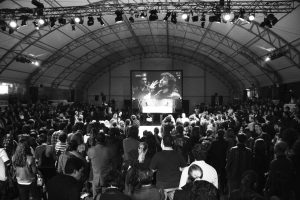
Arikan interviewed over Mi Minor
The play was being discussed regularly on TV, websites and online forums and both Mi Minör and my name were being linked to a secret international conspiracy against Turkey and its ruling party, the AKP. Many of the comments referenced the 2004 banning of my book Stop Hurting my Flesh. I received hundreds of emails and tweets threatening rape and death as a result of this campaign.
For three nightmarish months, we were trapped in our own house and did not set foot outside. One day, I saw that one of my prominent accusers was tweeting about me for four hours. The sentences he chose to tweet were all excerpts from my research publication The Body Knows, taken out of context and manipulating what I had written. Those tweets were the last straw.
I left our house, our loved ones, our pasts. We left in a night with a single suitcase and came to Wales, which had always been my dream country. I never imagined my arrival in Cardiff would be like this; feeling bitter, broken and incomplete.
Two years later my partner, who had remained in Turkey, and I got married. In the first month, I learned my husband had brain cancer. Operations, chemotherapy, radiotherapy followed… Within a year, I lost him. I visited him, but sadly I wasn’t able to go to his funeral because of new accusations levelled against me. This was a turning point in my life. I lost my husband. I lost my trust in people. I lost my savings to pay for his care. I lost everything.
In all of this emotional turmoil, I started walking every day for five or six hours. Geese became my best friend and my remedy. I walked for months. I walked and walked everywhere, in the mountains, in the valleys, at the seaside.
These walks had a transformative effect on me. I had discovered a way to live as a woman who had learned to accept herself, rather than a shattered and a lost woman.
Maybe there is an umbilical cord, beyond my consciousness, between me and the wild nature of Wales. I feel this land always wrapped itself around me, talked to me like a mother during the difficult time in my life. For this reason, I wrote my latest play; Y Brain/Kargalar (Crows), written in Welsh and Turkish and produced by Be Aware Productions. It describes my story, the special place this land has in my life and how it transformed me. The title refers to my constant companions during this time – the crows. One reviewer called it “unashamedly lyrical…even as it touches on dark themes”.
On 20 February 2019, as the play was being staged, a new indictment was issued against 16 people, including me, over Mi Minör; I now face a life sentence. Because of this absurd accusation, I feel ever more strongly that Wales is protecting me.
It was at this time that I was diagnosed with Asperger’s syndrome/autistic spectrum disorder and I’ve received many answers about myself as a result. From this moment, a new discovery and understanding started. I set out to discover myself with this new knowledge. As soon as I could know who I’m not, I could find out who I am.
I realise that my wiring system simply makes it harder for me to do many things that come naturally to other people. On the flip side, it is important to be aware that autism can also give me many magical perceptions that many neurotypicals simply are not capable of. I believe I was able to write Mi Minör because of my different perceptions.
I have therapy twice a week and I have started to understand what I have been through all my life. My therapists told me that I was manipulated and I was emotionally and sexually abused by whom I love and trust the most; it was a big shock for me. I spent half of my life trying to help abused victims, and I never thought I was a victim. They said this is very common because autistic women are not aware of when they were used. How could I have been so blind?
I couldn’t work out that I was being played by others, like a fish on a line. As an autistic, communication is about interpreting with a basic belief in what people tell me because I don’t tell lies myself. But I have learned how much capacity for lies exists. Autistic people can be gullible, manipulated and taken advantage of. But I learned that regret is the poison of life, the prison of the soul.
The most significant benefit of this process is that I am learning again like a child to re-evaluate everything with curiosity and enthusiasm. It also gives me the chance to reconstruct the rest of my life without hiding myself, being subjugated to anyone, and living without fear.
Autism diagnosis and discovery were liberating for me. There is still not enough autism spectrum awareness even today. That is why I decided to come out about my autism. I strongly believe that if those of us who are on the autistic spectrum share our experiences openly, then it wouldn’t only help other autistic people, it would help neurotypical people to better understand both us and our behaviour.
Looking back at the last few years, I have been thrown into navigating most of the challenging aspects and life experiences and there has been a complete cracking of all masks.
This process is not easy at all, sometimes my soul, sometimes my heart, sometimes all my cells hurt, but it also causes me to recognise a liberation I have never known before.
Fortunately, during this process, I have been learning a lot about myself and how I have masked myself as an Aspie-woman… For me, masking myself is more harmful even than not knowing I’m autistic. Masking means that I create a different Meltem to handle every situation. I have never felt a strong connection with my core. When I am confronted with emotional upset, my brain immediately goes into “fix it” mode, searching for a way to make the other person feel better so I can also relieve my own distress.
For most of my life, I’ve allowed myself to fit in with how I thought others wanted me to feel and act, especially those I loved. My dark night gave me so much pain I broke free and started to care for myself and heal. Taking me back to my primordial self, not the heroic one that burns out, to step back from the battle line of existence, to remember the gods and spiritual parts of nature, my own nature and the person I was at the beginning.
The last two years have been exciting for me. It is as if I died and was reincarnated again. In the end, I understand that my true nature is not to be some ideal that I have to live up to. It’s ok to be who I am right now, and that’s what I can make friends with and celebrate. I learned it’s about finding my own true nature and speaking and acting from that. Whatever our quality is, that’s our wealth and our beauty. That’s what other people respond to. I’m not perfect, but I’m real…[/vc_column_text][/vc_column][/vc_row]